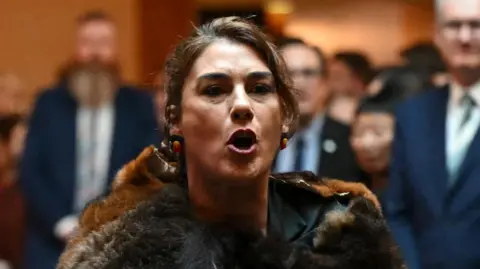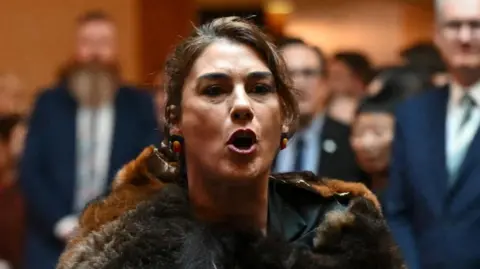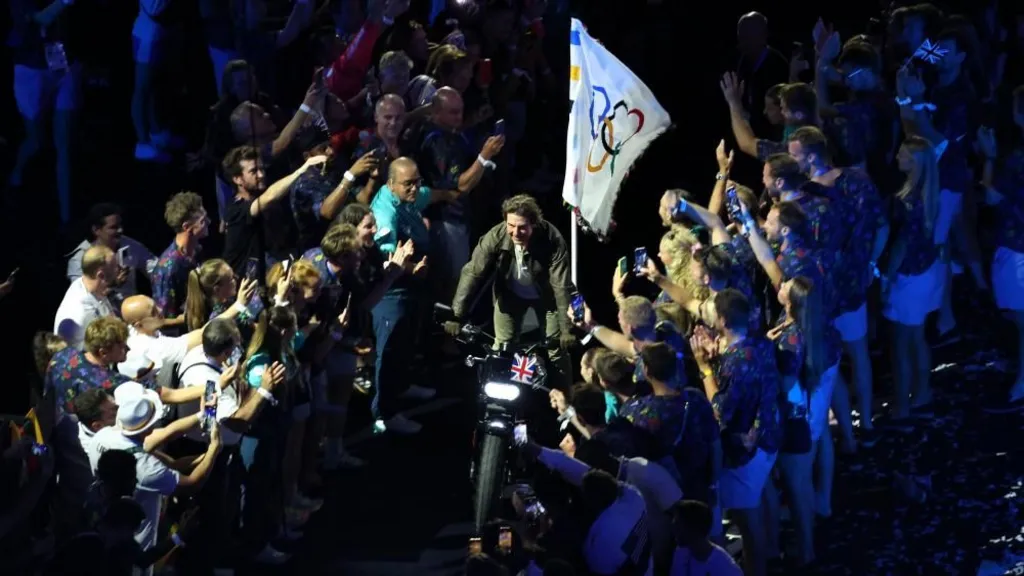Lidia Thorpe is no stranger to controversy and it’s not the first time she’s voiced her views on the British monarchy.
The Gunnai, Gunditjmara and Djab Wurrung woman has been a senator for Victoria since 2020, the first Aboriginal senator from that state.
Prior to that, she had a history of Indigenous activism – she also worked as the chairperson of Naidoc (National Aborigines and Islanders Day Observance Committee) for the state of Victoria, an organisation that works to recognise and teach Australians about First Nations cultures and their histories.
In 2022, while being sworn in to parliament after a re-election, she called the late Queen a coloniser.
“I sovereign, Lidia Thorpe, do solemnly and sincerely swear that I will be faithful and I bear true allegiance to the colonising her majesty Queen Elizabeth II,” she said, as she was being sworn in.
After criticism from other senators, she then repeated the oath as printed.
So Monday’s incident wouldn’t have come as much surprise to anyone who follows Australian politics. Lidia Thorpe has made her views clear – that British settlement saw huge numbers of Indigenous people massacred and the scars of colonisation are still very apparent for many First Nations people in Australia.
Whether or not you agree with Lidia Thorpe’s approach, the fact is that there are deep disparities between First Nations people and non-Indigenous Australians when it comes to many indicators including education, health and life expectancy.
Last year Prime Minister Anthony Albanese said a young Indigenous man was more likely to go to jail than university, which is borne out by statistics, as ABC showed.
And between 2020 and 2022, the life expectancy of Aboriginal and Torres Strait Islanders was estimated to be eight years shorter than non-Indigenous Australians.
“I wanted to send a clear message to the King of England that he’s not the King of this country, he’s not my king, he’s not sovereign,” Thorpe told the BBC after being removed from the Great Hall after heckling. “To be sovereign you have to be of this land. He’s not of this land.”
She went on.
“How can he stand up there and say he’s the King of our country – he’s stolen so much wealth from our people and from our land and he needs to give that back. And he needs to entertain a conversation for a peace treaty in this country,” she said.
“We can lead that, we can do that – we can be a better country but we cannot bow to the coloniser whose ancestors he spoke about in there are responsible for mass murder, for mass genocide.”
 Reuters
ReutersOne of Lidia Thorpe’s biggest grievances is the fact that Australia is the only Commonwealth nation that has never signed a treaty with its Indigenous people. She’s been pushing for that as a priority.
For her, last year’s referendum on a Voice to Parliament – a body made up of Aboriginal and Torres Strait Islanders providing advice to parliament on Indigenous issues – was a distraction from what was important – a treaty.
Australians resoundingly voted against the proposal and she was one of a minority of First Nations people who also voted no.
She told the BBC at the time that the Voice was about “assimilating us into the colonial constitution to make us nice, neat little Indigenous Australians that will continue to be oppressed by the coloniser”.
But she was in the minority among First Nations people to do so. Regions with a high proportion of Indigenous Australians overwhelmingly voted yes but Aboriginal people make up close to 4% of Australia’s population. Nationally, just over 60% of voters across Australia voted against.
Not all Indigenous leaders appear as troubled by royal visits as Lidia Thorpe.
Allira Davis, co-chair of the Uluru Youth Dialogue, said she respected the late Queen, even describing her as “beautiful”.
What about the current visit by King Charles?
“I don’t think it’s that important. We’re our own country,” Allira Davis told the BBC, speaking before Lidia Thorpe heckled him in Canberra.
“Understanding the history of what has happened in this country is really, really key. We’re not just a white country anymore. We’re a very brown country. We’re a very multicultural country.
“So I’m all for becoming a republic, but we need to deal with recognising our First Nations people.”
So although Lidia Thorpe reflects a view shared by many about the damage that colonisation did – and still does – not everyone agrees with her approach.
Local media have reported that former co-workers have found her difficult to work with.
But Lidia Thorpe – who is now an independent after leaving the Greens over the party’s support for the Yes vote in the referendum – is unlikely to change tack. She thinks the King needs to play a bigger role in making good the ills of the past.




